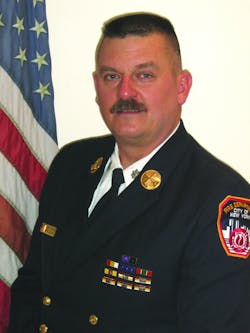Fire Scene: Company Officers: What Are Your Standards?
You walk into a firehouse and the apparatus floor is a mess, the rig has not been washed and the snow chains are laying on the floor next to a locker—and it’s April. You are standing across the street watching as an engine company arrives at a fire scene. The firefighters dismount the apparatus and begin to move around looking for something. After more than a few minutes, they finally find it, their radios, which were stored in the compartment with the tools. You visit your buddy at his firehouse, and as he is showing you around, you notice that many of the turnout coats have the reflective stripes either missing or hanging off, several of the coats are discolored from heat exposure, and some the gloves hanging off the coats are simple leather work gloves.
What is the problem in all of these situations? A lack of standards. A standard is defined as:
- Something considered by an authority or by general consent as a basis of comparison; an approved model.
- A level of quality, achievement, etc., that is considered acceptable or desirable.
In other words, standards are the quality of the unit, and where I come from, the company officer is the person responsible for the establishment and enforcement of the unit’s standards. That leads us to the next question: What issues, elements or tasks are subject to standards?
Turnout gear
Let’s start with one of the issues described above. Each and every firefighter and company officer in a unit should have a clean, intact and reliable set of turnout gear. I have discussed this issue before and stated that when the chips are down and you are suddenly being exposed to the most dangerous conditions possible, you will be thankful that you were wearing a set of gear that met the standard. Go talk with a firefighter who can no longer use his hands very well because he was burned at a fire wearing canvas work gloves because, “they feel better.”
Training
I’ve said hundreds of times, if you are a career fire officer and you are not conducting training every shift, you are not doing your job! Training is the most important activity that occurs in a firehouse every day. And it’s not just doing it that matters. Quality training must be planned. Put some time into selecting topics, tools or tactics. Don’t train on the same tool every day. Create an interesting and varied training schedule and stick to it.
Discipline
Discipline is not the most enjoyable activity for most fire officers but, when required, it must be delivered. This is also a complex issue that must be performed correctly. Some of the basic disciplinary issues are:
- Don’t let actions or behaviors that require discipline to go unnoticed.
- Don’t walk past a mistake.
- Deal with each person, taking into considering their previous positive and negative history.
As Retired General Colin Powell said, if you treat everyone equally nicely, regardless of their contributions, you will simply cause the most active and energetic people on your shift to become angry.
Readiness
Is your company ready to respond to an emergency at any moment? Is the apparatus fuel and water tank full at all times? Have the firefighters placed their turnout gear at their respective riding positions, in a manner that allows them to get dressed rapidly? Do you require your firefighters to don their turnout gear before responding to every alarm? Do you allow anyone to work on their personal vehicle in front of the apparatus or on the front apron? Do you allow firefighters to take a radio and walk around the block to pick up something at the store? Whatever your answers, they will have an impact on your unit’s ability to be ready!
Teamwork
It doesn’t really matter how many firefighters work on your crew or shift if they aren’t a team. Teamwork is a vital ingredient for a firefighting unit. Firefighting is a team sport, and the company officer is the coach. Assigning firefighters to work with others after a time will start to create a positive working relationship between the two. Conducting effective and relevant training exercises allows the firefighters on the crew to interact and observe each other and begin to know what to expect from each other. Giving a group of firefighters a chore or challenge to solve together will most often increase their teamwork skills. Try it.
In sum
So you see, setting high standards is not hard to do and will produce positive results for the officer, the firefighters and the public we all serve.
About the Author
John J. Salka Jr.
Battalion Chief
JOHN J. SALKA JR., who is a Firehouse contributing editor, retired as a battalion chief with FDNY, serving as commander of the 18th battalion in the Bronx. Salka has instructed at several FDNY training programs, including the department’s Probationary Firefighters School, Captains Management Program and Battalion Chiefs Command Course. He conducts training programs at national and local conferences and has been recognized for his firefighter survival course, “Get Out Alive.” Salka co-authored the FDNY Engine Company Operations manual and wrote the book "First In, Last Out–Leadership Lessons From the New York Fire Department." He also operates Fire Command Training, which is a New York-based fire service training and consulting firm.

